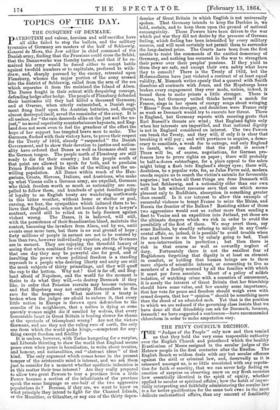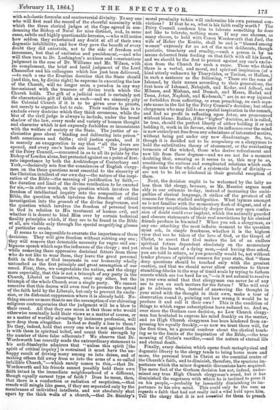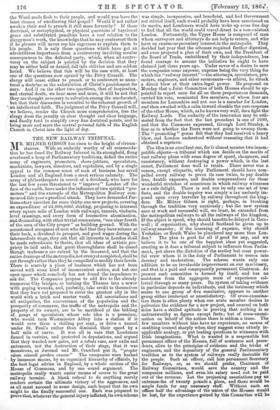THE PRIVY COUNCIL'S DECISION.
THE "Judges of the People" only now and then remind us that they hold the very same responsible authority over the English Church and priesthood which the healthy Erastianism of Moses assigned to the secular judges of the Hebrew people in the first centuries after the Exodus. The English Bench so seldom deals with any but secular offences against the civil or criminal law, and, deservedly as it is esteemed amongst us, is so little associated with any reputa- tion for faith or sanctity, that we can never help feeling an emotion of surprise on observing anew on any fresh occasion how essentially identical is the spirit of equity, whether applied to secular or spiritual affairs ; how the habit of impar- tially interpreting and faithfully administering the- secular law is a far better qualification for the tainie task even in the most delicate ecclesiastical affairs, than any amount of familiarity with scholastic formula) and controversial divinity. To any one who will first read the record of the cheerful unanimity with which the three clerical judges at the Cape agreed in con- demning the Bishop of Natal for nine distinct, and, in some cases, subtle and highly questionable heresies, —who will notice how seldom they entertained any doubt at all of their own dogmatic infallibility, and how they gave the benefit of every doubt they did entertain, not to the side of freedom and innocence, but that of exclusion and punishment,—and who will then turn to Dr. Lushington's anxious and conscientious judgment in the case of Dr. Williams and Mr. Wilson, with its complement, the brief and lucid judgment of the Lord Chancellor and his colleagues which has just been delivered, —to such a one the Erastian doctrine that the State should (and this, too, by divine right) be supreme in executing the law of the Church, will no longer seem a paradox in any way inconsistent with the treasure of divine truth which the Church holds. The gift of a judicial mind is certainly not the characteristic gift of faith as such—and we sincerely pity the Colonial Church if it is to be given over to priests, not merely to organize but to rule. Their uniform bias is to exclude every doctrine which they think erroneous, while the bias of the civil judge is always to include, under the broad shadow of the law, every mode and variety of human thought and character which is not expressly forbidden as inconsistent with the welfare of society or the State. The justice of ec- clesiastics goes about "binding and delivering into prison" both consciences and faiths ; civil justice speaks, and it is scarcely an exaggeration to say that " all the doors are opened, and every one's bands are loosed." The judgment of the Privy Council,—concurred in as to all its points by the Bishop of London alone, but protested against on a point of first- rate importance by both the Archbishops of Canterbury and York,—decisively sets free the consciences of English clergy- men on the three questions most essential to the sincerity of the Christian intellect of our own day—the nature of the inspi- ration of the Bible—the meaning of justification by faith,— the duration and limit of the divine retribution to be exacted for sin,—in other words, on the question which involves the freedom of intellectual inquiry into the composition of the Bible, the question which involves the freedom of ethical investigation into the grounds of the divine forgiveness, and the question which involves the freedom of personal trust in God in relation to His treatment of human evil, and whether it is decent to bind Him over by certain technical -finality principles which, if they are to be found in the Bible at all, are visible only through the special magnifying glasses of particular creeds.
It seems to us impossible to overrate the importance of these decisions. They will give freedom without robbing any one ; they will remove that detestable necessity for vague and am- biguous speech which saps the influence of the clergy ; and yet ) while removing these oppressive doctrinal fetters from those who do not like to wear them, they leave the great personal faith in the Son of God incarnate in our humanity wholly untouched as the first principle and great assumption of our creed. First, then, we congratulate the nation, and the clergy more especially, that this is not a triumph of any party in the Church, Liberal or Conservative, over any other, but the triumph of the whole Church over a single party. We cannot conceive that this decree will even tend to promote the spread of the faith held by the Liberals, but only to prevent its exclu- sion, or its dishonest suppression where it is already held. No- thing amazes us more than to see the assu.mptionof our shivering religious contemporaries that the judgment will be a blow to their creed. All that they can mean is that those who would otherwise nominally hold their views as a matter of course, or as a matter of worldly advantage'by insincere profession, will mow drop them altogether. Is that so deadly a loss to them? Do they, indeed, hold that every one who is not against them is with them in spiritual belief, and count their strength by the number of these false adherents? We observe that Dr. Wordsworth has recently made the extraordinary statement to his anti-Stanleyite admirers that " unless this spirit [the spirit of critical inquiry] is restrained it must have the un- happy result of driving many among us into deism, and of making others fall away from us into the arms of a so-called infallible Church,"—which surely comes to this,—that Dr. Wordsworth and his friends cannot possibly hold their own -faith intact in the immediate neighbourhood of a different, though equally earnest type of faith ? Does he mean, then, that there is a conduction or radiation of scepticism,—that creeds will mingle like gases, if they are separated only by the membranes of individual intellects, and not absolutely shut apart by the thick walls of a church,—that Dr. Stanley's moral proximity to him will undermine his own personal con- victions ? If that be so, what is his faith really worth ? The Privy Council condemn him to tolerate something he does not like to tolerate, nothing more. If any one chooses, as many choose, to hold with Canon Wordsworth that Jael, the wife of Heber the Kenite, shall be and is " blessed among women" expressly for an act of the most deliberate, though patriotic, treachery and cruelty,—such a person is by no means debarred from feeding on that faith with all his heart, and we should be the first to protest against any one's exclu- sion from the Church for such a cause. Those who think there is a verbal, and moral, and spiritual inspiration (of a kind utterly unknown by Thucydides, or Tacitus, or Hallam,) in such a sentence as the following, "These are the sons of Ishmael, by their names according to their generations, the first-born of Ishmael, Nebajoth, and Kedar, and Adbeel, and Mibsam, and Mishma, and Dumah, and Massa, Hadad and Tema, Jetur, Naphish, and Kedemah," are in no way injured or forbidden from reflecting, or even preaching, on each sepa- rate name in the list by the Privy Council's decision; but other clergymen who may fail to see special inspiration in the remark, and find no profit in reflecting upon Jetur, are pronounced without blame. Rather, if the " higher" doctrine, as it is called, be true, should the perfect liberty of either holding it or not holding it, work in its favour, since its influence over the mind is now entirelyset free from any admixture of interested motive, without being put under any new disadvantage. So, too, though it is decided not to be compulsory on a clergyman to hold the substitutive theory of atonement, or the everlasting torments of the wicked, those who derive refreshment and new life from these dogmas—and we are not for a moment doubting that, amazing as it seems to us, this may be so, considering the curious and complicated relations which such dogmas take to the whole of a systematic body of divinity— are not to be let or hindered in their grateful reception of them.
Next, the decision ought to be welcomed by the laity no less than th8 clergy, because, as Mr. Maurice argues most ably in our columns to-day, instead of increasing the ambi- guities of clerical language, it strikes off the greatest of all reasons for those studied ambiguities. What layman amongst us is not familiar with the momentary flash of disgust, and of a momentary scepticism infinitely deeper than any open confes- sion of doubt could ever implant, which the naturally guarded and obscure statements of their real convictions by his clerical friends produce in his mind ? When you ask a clergyman, as any one attaching the most infinite moment to the question must ask, in simple frankness, whether it is the highest view that can be taken of the love of God, or the Gospel of Christ, to assert that God makes the lot of an endless spiritual future dependent absolutely on the momentary creed in the heart of a dying man,—and having thus asked, you are told in return, as you generally would be, not without tender phrases of spiritual concern for your state, that "these deep questions should be touched only with the greatest caution, and that we should never allow ourselves to throw stumbling-blocks in the way of timid souls by trying to fathom secrets which are too hard for us,"—is it not natural to resolve in your own mind that that clergyman can never be of any use to you on such matters for the future ? Who will ever go to advisors who, instead of answering the thought in your mind with the thought in their own, make a tour of observation round it, pointing out how wrong it would be to produce it and call it their own ? This is the condition of things to which vague subscriptions have reduced us. And as, ever since the Gorham case decision, no Low Church clergy- man has hesitated to express his mind frankly on the matter, and no High Church clergyman has been hindered from ex- pressing his equally frankly,—so now we trust there will, for the first time, be a general candour about the clerical teach- ing as to the limits of the inspiration of the Bible,—the true meaning of Christ's sacrifice,—and the nature of eternal life and eternal death.
Finally, every decision which opens fresh metaphysical and dogmatic liberty to the clergy tends to bring home more and more, the personal trust in Christ as the essential centre of the Church's faith, and to diminish, therefore, the spurious im- portance which the minor dogmatic discussions have acquired. The mere fact of the Gorham decision has not, indeed, under- mined any true High Church clergyman's creed, but it has diminished the eagerness with which he is inclined to press it on his people,—probably by insensibly diminishing its im- portance to his own mind. This could only be the case as regards a faith that had not really laid a vital hold upon him. Tell the clergy that it is not essential for them to preach the Word made flesh to their people, and would you have the least chance of smothering that gospel ? Would it not rather awaken their zeal to preach it still more fervently? If these doctrinal, or metaphysical, or physical questions of baptismal grace and substituted penalties have a real relation to the clergyman's work, the knowledge that he may controvert them if he pleases will never sap his eagerness to explain them to his people. It is only those questions which have got an adventitious importance from a controversy involving secular consequences to -the defeated party, which, when all contro- versy on the subject is quieted by the decision that they may be either held or denied, fall into oblivion and are seldom heard. We believe that this will be the case with, at least one of the questions now opened by the Privy Council. The clergy will cease either to preach or to controvert so unna- tural a doctrine as the substitution of Christ's punishment for ours. And if on the other two questions, that of inspiration, and eternal death, we hear more and more, it will be not that they are thought necessary to salvation among the uneducated, but that their discussion is essential to the coherent growth of an intellectual faith. The judgment of the Privy Council will, we believe, render the Church more comprehensive, free the 'clergy from the penalty on clear thought and clear language, and finally tend to simplify away fine doctrinal points, and to bring more and more the central personal faith of the English Church in Christ into the light of day.
































 Previous page
Previous page